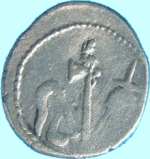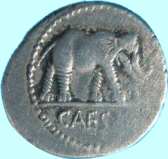|
Roma, 12.5.2006
Egregio
Lettore,
trascrivo di
seguito i dati significativi pertinenti alla moneta di
figura:
Denario1, zecca al seguito di Cesare, Crawford
443, Sydenham
1006, 49-48 a. C.2,
indice di rarità
"(1)"3.
Descrizione
(sono indicate in rosso le parti della leggenda
usurate):
D. Emblemi sacerdotali: culullus,
aspergillum, ascia e apex.4 Bordo perlinato.
R. Elefante a
destra che calpesta un drago; in esergo CAESAR.5 Bordo perlinato.
La ricerca
nel web di monete di tipologia simile a quella di
figura ha prodotto i seguenti risultati:
- http://www.sixbid.com/nav.php?lot=939&p=viewlot&sid=385
Lot: 939 Bid on this lot at CNG Estimate: 1000 USD
The Caesarians. Julius Caesar. April-August 49 BC.
AR Denarius (18mm, 4.15 g, 9h). Military mint
traveling with Caesar. Elephant advancing right,
trampling on horned serpent / Emblems of the
pontificate: simpulum, aspergillum, securis, and
apex. Crawford 443/1; CRI 9; Sydenham 1006; RSC
49. EF, attractive light gray and gold toning. Ex
Gorny & Mosch 151 (9 October 2006), lot 346.
- http://www.wildwinds.com/coins/sear5/s1399.html
Sale: Triton VIII, Lot: 932. Closing Date: Jan 10,
2005. JULIUS CAESAR. 49-48 BC. AR Denarius (3.91
gm, 9h). Military mint travelling with Caesar.
Estimate $500 Sold For $500 JULIUS CAESAR. 49-48
BC. AR denarius (3.91 gm, 9h). Military mint
travelling with Caesar. CAESAR in exergue,
elephant walking right, trampling on horned /
Simpulum, sprinkler, axe (surmounted by a wolf's
head), and priest's hat. Crawford 443/1; CRI 9;
Sydenham 1006; Kestner 3518; BMCRR Gaul 27; RSC
49. Good VF, light gray toning, unusually
well-centered. Rare with dragon. ($500).
- http://www.wildwinds.com/coins/imp/julius_caesar/RSC_0049.11.jpg
Item Sold At Auction #5 Web Product ID: 1379
Estimate: $400.00 Final Sale Price: $266.20
Denomination: Denarius Grade: Good VF Reference:
Crawford 443/1; Sear 9; Sydenham 1006; RSC 49
Julius Caesar. 49-48 BC. AR Denarius (3.47 gm).
CAESAR in exergue, elephant right, trampling on
serpent / Simpulum, sprinkler, axe and priest's
hat. Crawford 443/1; Sear 9; Sydenham 1006; RSC
49. Good VF. Estimate $300. This is the first coin
struck in the name of Julius Caesar. The symbolism
on the obverse apparently alludes to the conquest
of good over evil, Caesar's victory over the
Gauls, while the reverse refers to Caesar's
possession of the office of Pontifex Maximus.
- http://www.sixbid.com/nav.php?lot=940&p=viewlot&sid=385
Lot: 940 Bid on this lot at CNG Estimate:
750 USD The Caesarians. Julius Caesar.
April-August 49 BC. AR Denarius (17mm, 4.21 g,
6h). Military mint traveling with Caesar. Elephant
advancing right, trampling on horned serpent /
Emblems of the pontificate: simpulum, aspergillum,
securis, and apex. Crawford 443/1; CRI 9; Sydenham
1006; RSC 49. EF, lustrous with light golden
toning, two minor scratches in field on reverse.
- http://www.sixbid.com/nav.php?lot=941&p=viewlot&sid=385
The Caesarians. Julius Caesar. April-August 49 BC.
AR Denarius (19mm, 4.04 g, 3h). Military mint
traveling with Caesar. Elephant advancing right,
trampling on horned serpent / Emblems of the
pontificate: simpulum, aspergillum, securis, and
apex. Crawford 443/1; CRI 9; Sydenham 1006; RSC
49. Good VF, toned, slightly off center.
- http://www.coinarchives.com/a/lotviewer.php?LotID=408699&AucID=731&Lot=216&Val=3d51e66b6197597948ceef3b63d775bf
Auktionshaus H. D. Rauch GmbH Numismata Auction
2011 Auction date: 15 April 2011 Lot number: 216
RÖMISCHE REPUBLIK C. Iulius Caesar Denarius
(3,83g), Heeresmünzstätte in Hispania Citerior
oder der Gallia Narbonensis 49 v.Chr. Av.: CAESAR,
Elephant n.r., davor Schlange. Rv.: Embleme
römischer Priesterschaften (Simpulum, Aspergillum,
Securis, Apex). -- Am Rand etwas porös mit kleinen
Ausbrüchen, leichte Korrosionsspuren. Cr 443/1,
Albert 1373, CRI 9. Datierung und
Münzstättenzuweisung nach Woytek, B., Arma et
Nummi, Wien 2003, S. 119ff. s.sch. Starting Price:
200 EUR.
- http://www.coinarchives.com/a/lotviewer.php?LotID=408700&AucID=731&Lot=217&Val=3c8dd0ccc7ee40ee9a0dbd81cc6e173b
Auktionshaus H. D. Rauch GmbH Numismata Auction
2011 Auction date: 15 April 2011 Lot number: 217
RÖMISCHE REPUBLIK C. Iulius Caesar Denarius
(3,51g), Heeresmünzstätte in Hispania Citerior
oder der Gallia Narbonensis 49 v.Chr. Av.: CAESAR,
Elephant n.r., davor Schlange. Rv.: Embleme
römischer Priesterschaften (Simpulum, Aspergillum,
Securis, Apex). -- Leichte Prägeschwäche am Rd. Cr
443/1, Albert 1373, CRI 9. Datierung und
Münzstättenzuweisung nach Woytek, B., Arma et
Nummi, Wien 2003, S. 119ff. s.sch.-vzgl. Starting
Price: 450 EUR.
- http://www.coinarchives.com/a/lotviewer.php?LotID=404170&AucID=725&Lot=813&Val=adcc746b243f100c5a568fbbd861e883
Numismatica Ars Classica Auction 59 Auction date:
4 April 2011 Lot number: 813 Price realized: 1,400
CHF (approx. 1,508 USD as of the auction
date) Note: Prices do not include buyer's fees.
Lot description: The Roman Republic Julius Caesar.
Denarius, Gallia Narbonensis Caesar 49. AR 3.74 g.
Pontifical emblems: culullus, aspergillum, axe and
apex. Rev. Elephant r., trampling dragon; in
exergue, CAESAR. Babelon Julia 9. Sydenham 1006.
C. 9. Sear Imperators 9. Arma et Nummi pl. 2, 37.
Crawford 443/1. Lightly toned and extremely fine
Ex Lanz sale 146, 331. Estimate: 900 CHF.
Concludo
osservando che lo stile e l'aspetto generale della
moneta appaiono accettabili ma, in assenza delle
caratteristiche fisiche, non sarà possibile a chi
scrive esprimere un parere di autenticità. Se
autentica, la moneta possiede un valore fortemente
dipendente dallo stato di conservazione, dalla
centratura del tondello e dalla perfezione e rilievo
dei dettagli. Quella di figura è una moneta che
presenta notevoli tracce di usura nel quadrante
inferiore destro; pertanto, per determinarne il
valore, è necessario rifarsi a monete di pari
tipologia e stato di conservazione. Applicando la
metodologia dianzi enunciata, si può ritenere che la
moneta di figura, posto che sia autentica, valga,
nello stato in cui si trova, circa 100 Euro, come
prezzo d'asta e, verosimilmente, un valore un po' più
basso, se venduta attraverso Ebay.
Un saluto
cordiale.
Giulio De
Florio
-------------------------------
Note:
(1) Raccolgo in tabella le caratteristiche
fisiche dei denari della tipologia di figura
presenti nei link di cui sopra:
| Riferimenti |
Peso (g.) |
Asse di conio (ore) |
Diametro (mm)
|
| Link1 |
4,15 |
9 |
18 |
| Link2 |
3,91 |
9 |
- |
| Link3 |
3,47 |
- |
- |
| Link4 |
4,21 |
6 |
17 |
| Link5 |
4,04 |
3 |
19 |
| Link6 |
3,83 |
- |
- |
| Link7 |
3,51 |
- |
- |
| Link8 |
3,74 |
- |
- |
In assenza
delle caratteristiche fisiche della moneta di figura
non sarà possibile completare l'esame di
autenticità.
(2) Gli studiosi non sono concordi nella
datazione sopra indicata, proposta dal Crawford
(49-48 a. C.). Il Sydenham fornisce come datazione
54-51 a. C.
(3) La moneta di figura è piuttosto
comune, tant'è che, senza troppe difficoltà, è stato
possibile reperirne nel web un gran numero di
esemplari simili, come si può constatare cliccando
qui. Va aggiunto anche che si tratta di una
moneta molto richiesta sul mercato numismatico in
quanto battuta sotto l'imperio di Giulio Cesare. In
sostanza quindi, all'elevata domanda di mercato,
corrisponde anche un'offerta abbondante.
(4) Il dritto della moneta allude
all'ufficio di Pontefice Massimo che Cesare
ricopriva. Di qui gli emblemi pontificali:
"culullus" (la tazza per bere); "aspergillum"
(l'aspersorio); "securis" (l'ascia); "apex"
(la tiara, l'alto copricapo terminante con una
punta).
(5) Questa è la prima moneta battuta
nel nome di Giulio Cesare (v. link).
Il rovescio ritrae un elefante che
calpesta un drago, a simboleggiare, secondo il
Crawford, la vittoria sul male.
|

